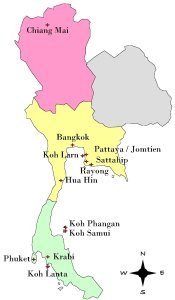The Kingdom of Thailand is an independent country that lies in
the heart of Southeast Asia with Bangkok being its capital. Bordered to the north
by Laos and Burma, to the east by Laos and Cambodia, to the south by the Gulf of
Thailand and Malaysia, and to the west by the Andaman Sea and Burma, it is the only
country in Southeast Asia never colonized by a European power.
While Thailand is the world's 50th largest country in land mass
(approximately 513,000 square kilometers), it is the world's 20th largest
country in terms of population (approximately 64 million people). About 75% of
the population is

Click for larger Image
ethnically Thai, 14% is of Chinese origin, and 3% is ethnically
Malay. The rest belong to minority groups including Mons, Khmers and various hill
tribes. There is a small number of expatriates from other developed countries.
Although the official language of Thailand is Thai, the level of English proficiency
about the Thai people is increasing gradually.
Thailand is mainly an agricultural country with a fairly new
industry emphasizing on exports and a flourishing tourism industry, the peak
season of which is from November to April and in July and August.
The official calendar in Thailand is based on the Buddhist Era
which is 543 years ahead of the Western calendar, for example the year 2009 AD
is 2552 BE in Thailand.
Administratively Thailand's 76 provinces (Changwat) are divided
into districts [Amphoe or Khet (in Bangkok)], sub-districts [Tambol or Khwaeng
(in Bangkok)] and villages (Moobaan). Pensit & Laws has experience handling
numerous transactions in the places marked on the map to the right.
Land in Thailand is measured in terms of Tarang (Square) Wah,
Ngan and Rai. A comparison between the Thai units of measurement and the Metric
system is as follows:
| 1 Tarang Wah |
: |
4 Square Meters |
|
|
|
|
| 1 Ngan |
= |
100 Tarang Wah |
: |
400 Square Meters |
|
|
| 1 Rai |
= |
4 Ngan |
= |
400 Tarang Wah |
: |
1,600 Square Meters |
Usually there are 16 public holidays in a year however there
may be more declared by the Thai government. In the event that a public holiday
falls on a weekend, the government usually declares the following working day a
compensatory holiday.
| |
Public Holidays |
| |
Date |
Name |
| |
1 January |
New Year's Day |
| |
15th day of the 3nd Lunar month |
Makha Bucha Day |
| |
6 April |
Chakri Memorial Day |
| |
13 April - 15 April |
Songkran Festival |
| |
1 May |
Labour Day |
| |
5 May |
Coronation Day |
| |
11 May |
Royal Ploughing Ceremony Day |
| |
15th day of the 6th Lunar month |
Vesak Day |
| |
15th day of the 8th Lunar month |
Asalha Bucha Day |
| |
1st day of the 8th Lunar month |
First day of Buddhist Lent |
| |
12 August |
HM the Queen's Birthday (Mother's Day) |
| |
1st day of the 11th Lunar month |
End of Buddhist Lent |
| |
23 October |
Chulalongkorn Day |
| |
5 December |
HM the King's Birthday (Father's Day) |
| |
10 December |
Constitution Day |
| |
31 December |
New Year's Eve |
These days, traditional and modern, are observed but are
usually not public holidays.
| |
Observance |
| |
Date |
Name |
| |
2nd Saturday of January |
National Children's Day |
| |
16 January |
Teacher's Day |
| |
1st day of the 3nd Lunar month |
Chinese New Year |
| |
14 February |
Valentine's Day |
| |
15th day of the 8th Lunar month |
Ghost Festival |
| |
14th day of the 11th Lunar month |
Moon Festival |
| |
15th day of the 12th Lunar month |
Loy Krathong |
| |
15 December |
National Sports Day |
| |
25 December |
Christmas Day |